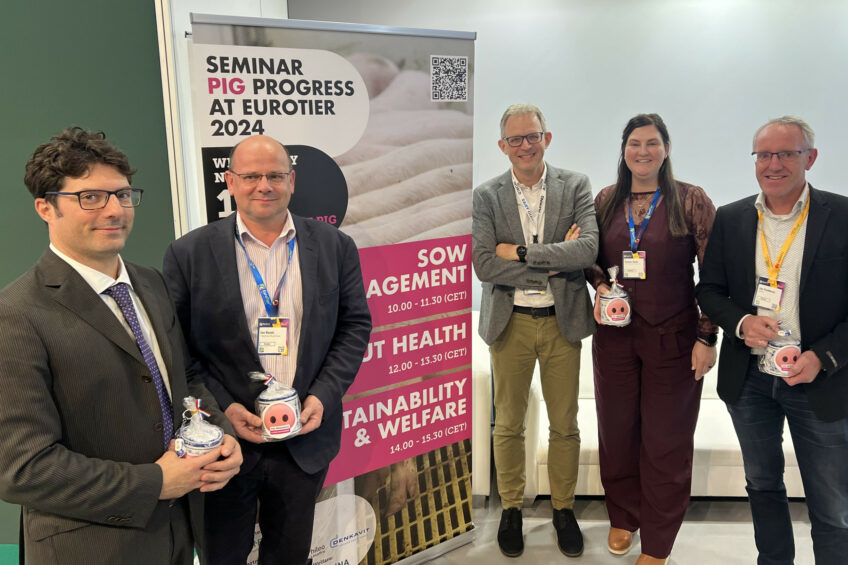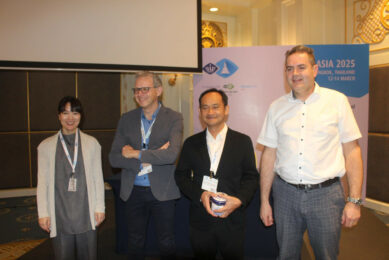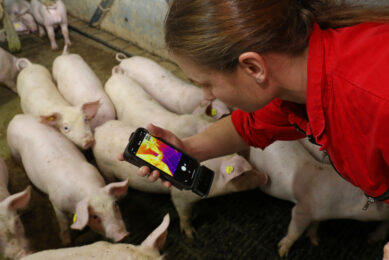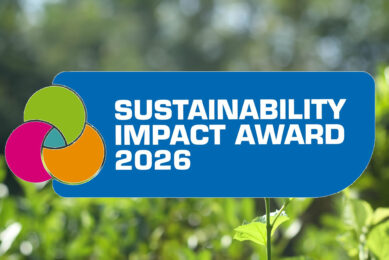On-demand: Seminar on Sustainability & Welfare

‘Sustainability and Welfare’ was the theme of the third of 3 Pig Progress seminars held at EuroTier in Germany, on Wednesday 13 November. The recording of the session with 4 expert speakers can be watched in its entirety, free of charge.
In a world with ever-growing numbers of people, the demand for meat as well as the scrutiny on how the meat is produced is growing. Did the animals have a good life? Was the meat produced in a sustainable way? Our 4 expert speakers set out to address such questions.
Pig feed, sustainability and welfare
The introductory presentation was given by Ir Jan Fledderus, senior consultant and swine product manager at Schothorst Feed Research in the Netherlands. He focused on how to optimise pig feed to achieve both sustainability and welfare.
First, he touched on the question as to how sustainability targets are implemented in feed formulation, with attention on the EU’s Green Deal and CO2 values of protein sources, including soy. He acknowledged that it is difficult to achieve completely zero CO2 emissions.
He then zoomed in on the effect of diet composition on pig welfare. In that context he pointed to the fact that protein content may have an impact on the pigs’ behaviour. Too low levels of protein in the feed may lead to more aggression or tail biting.
He also talked about CO2 emissions at pig fattening farms in the Netherlands between 1990 and 2020, and demonstrated that this had already come down substantially. Emissions related to feed reduced by 49%, he said.
Enhancing welfare by applying gel
Next on stage was Dr Jessica Seate of Animal Science Products in the United States. The topic of her talk was gel administration for enteric vaccines as an alternative to drench vaccination. Her company markets Underline gel, a green gel that can be mixed with an oral vaccine. The gel can be sprayed onto the floor, on top of creep feed or on the sow’s underline. That way, piglets will get in touch with any kind of vaccine in an easy and stress-free way, and even facilitating earlier vaccination. She demonstrated trials in which a Salmonella vaccine was administered.
Rooting for resilience
Graziano Mantovani, swine lead for Cargill in western Europe, then addressed the audience with a presentation on sustainable protein solutions for swine diets. He discussed various types of protein sources and also wondered aloud how to improve the value of those protein sources. At Cargill, he said, there is “significant expertise” around both the use of enzymes as well as phytogenics. The combination of fermentation products and phytogenics, which he called FPP, can be used to improve digestive efficiency. On one hand, he said, protein and amino acid digestion is being optimised without compromising animal performance; and on the other, the approach contributes to sustainability through reduced nitrogen emissions and lower feed costs.
Prevention and control of aggression
The final speaker of the Sustainability & Welfare session was Dr Ian Hands, director swine key accounts at Groupe Techna in France. He introduced the feed additive Robus Zen, which consists of “a combination of botanical ingredients with complementary biological effects”. The strategy is intended to be used to prevent tail biting or any other cannibalism-related behaviours, and it can be used in grow-finishers, piglets and sows.
He pointed to the effect of the feed additive on stress, digestion, inflammatory response and oxidative stress. He shared results of trials on finishing farms in France, Ireland and England.











